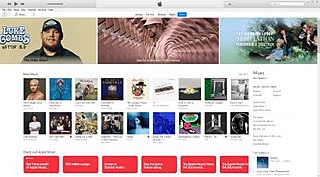
iTunes Store is a digital marketplace selling songs, albums, music videos, ringtones and alert tones. It was launched by Apple Inc. on April 28, 2003 for macOS, and on October 16, 2003 for Microsoft Windows. It launched as a mobile application with iOS on June 29, 2007.
Magnatune is an American independent record label based in Berkeley, California, founded in spring 2003. It only sold music for download through its website but added a print-CD-on-demand service in late 2004 and in September 2007 began selling complete albums and individual tracks through Amazon.com. In May 2008, Magnatune launched all-you-can-eat membership plans. From March 2010 Magnatune dropped the CD printing service and moved exclusively to all-you-can-eat membership plans. Magnatune was the first record label to license music online and as of May 2015 had sold over 7,000 licenses in its twelve years of existence.

eMusic is an online music and audiobook store that operates by subscription. In exchange for a monthly subscription eMusic users can download a fixed number of MP3 tracks per month. eMusic was established in 1998, is headquartered in New York City with an office in London, and is owned by TriPlay.
Beatport is an American electronic music-oriented online music store owned by LiveStyle. The company is based in Denver, Los Angeles, and Berlin. Beatport is oriented primarily towards DJs, selling full songs as well as resources that can be used for remixes. It also operates a specialized music streaming service oriented towards DJs.
Digital distribution, also referred to as content delivery, online distribution, or electronic software distribution, among others, is the delivery or distribution of digital media content such as audio, video, e-books, video games, and other software.
The open music model is an economic and technological framework for the recording industry based on research conducted at the Massachusetts Institute of Technology. It predicts that the playback of prerecorded music will be regarded as a service rather than as individually sold products, and that the only system for the digital distribution of music that will be viable against piracy is a subscription-based system supporting file sharing and free of digital rights management. The research also indicated that US$9 per month for unlimited use would be the market clearing price at that time, but recommended $5 per month as the long-term optimal price.
Mobipocket SA was a French company incorporated in March 2000 that created the .mobi e-book file format and produced the Mobipocket Reader software for mobile phones, personal digital assistants (PDA) and desktop operating systems.

OnClassical is an Italian independent record label. It features classical music mostly for single instrument or chamber ensemble.

Amie Street was an indie online music store and social network service created in 2006 by Brown University seniors Elliott Breece, Elias Roman, and Joshua Boltuch, in Providence, Rhode Island. The site was notable for its demand-based pricing. The company was later moved to Long Island City in Queens, New York. In late 2010, the site was sold to Amazon who redirected customers to their own website.
SpiralFrog was a very early music streaming service based in New York City that launched in the United States and Canada on September 17, 2007. SpiralFrog offered free and legal music downloads, all supported by advertising, and was the largest site of its kind in North America. On March 19, 2009, SpiralFrog terminated operations due to loan recalls. While SpiralFrog was not successful in the end, it nonetheless helped shaped the digital music industry shift from the purchase to streaming models, and its ultimate revenue recovery
Digital music stores sell copies of digital audio, for example in MP3 and WAV file formats. Unlike music streaming services, which typically charge a monthly subscription fee to stream digital audio, digital music stores download songs to the customer's hard disk drive of their device. The customer will have the copy of the song permanently on their disk, provided the track is not deleted by the customer, the disk does not get physically damaged, or suffers from being corrupted. Major examples of digital music stores include iTunes Store, Amazon Music, Bandcamp and 7digital.
The following is a comparison of e-book formats used to create and publish e-books.
PassAlong Networks, also known as Tennessee Pacific Group, LLC, was a developer of digital media innovations and services located in Franklin, Tennessee. The company had a digital music library of three million licensed songs, two million of which were raw MP3 music files, and provided a series of products and services in the digital media marketplace.
Amazon Music is a music streaming platform and digital music store operated by Amazon. As of January 2020, the service had 55 million subscribers.
Digital rights management (DRM) is the management of legal access to digital content. Various tools or technological protection measures (TPM), such as access control technologies, can restrict the use of proprietary hardware and copyrighted works. DRM technologies govern the use, modification and distribution of copyrighted works and of systems that enforce these policies within devices. DRM technologies include licensing agreements and encryption.
A music streaming service is a type of online streaming media service that focuses primarily on music, and sometimes other forms of digital audio content such as podcasts. These services are usually subscription-based services allowing users to stream digital copyright restricted songs on-demand from a centralized library provided by the service. Some services may offer free tiers with limitations, such as advertising and limits on use. They typically incorporate a recommender system to help users discover other songs they may enjoy based on their listening history and other factors, as well as the ability to create and share public playlists with other users. It may also include customized radio or social media platforms.
Klaus Heymann is a German entrepreneur and the founder and head of the Naxos record label.
HDtracks is a high-resolution digital music store offering DRM-free music in multiple formats as well as cover art with audio CD-quality and high-definition audio master recording quality download selections.
X5 Music Group is a record label based in Stockholm, Sweden with a branch in Manhattan, New York. Founded in 2003, it is a digital-only label that primarily licenses pre-existing music for compilation albums. X5 originally focused on classical music, and in 2011 its custom album The Greatest Video Game Music, featuring the London Philharmonic Orchestra, debuted at #23 on the Billboard 200. Since 2009 the company has had 24 albums on the chart; all 24 were custom digital releases produced by the label.




